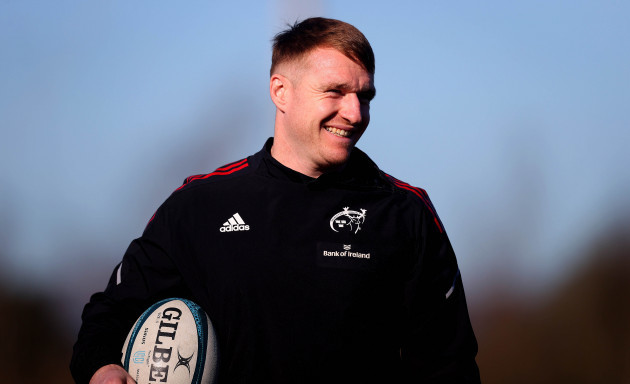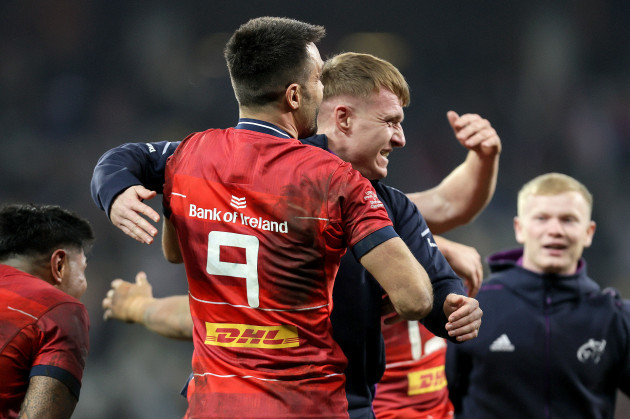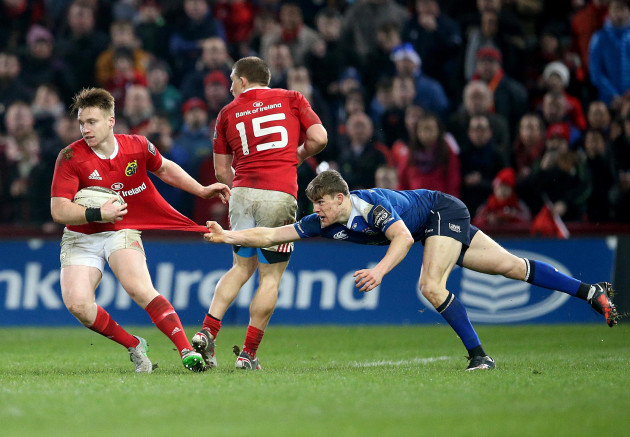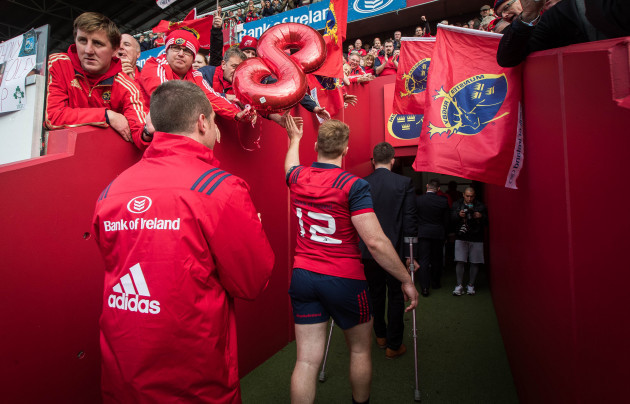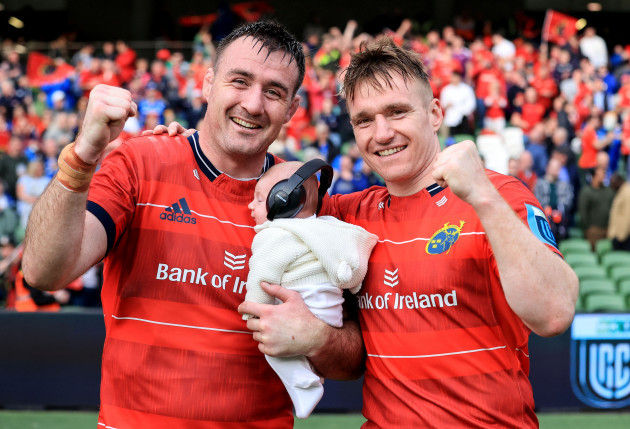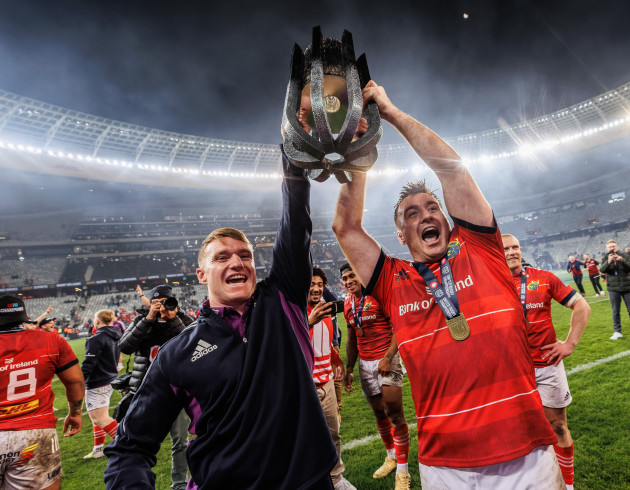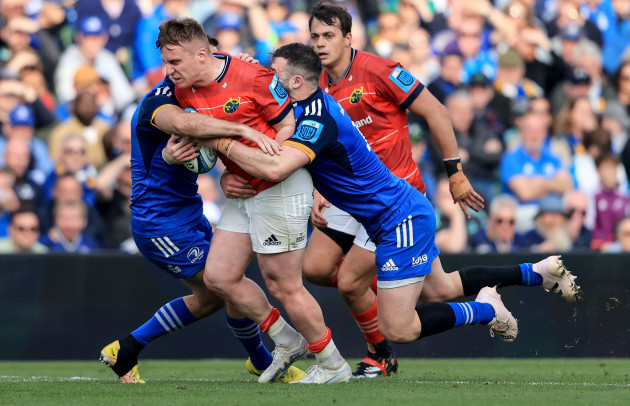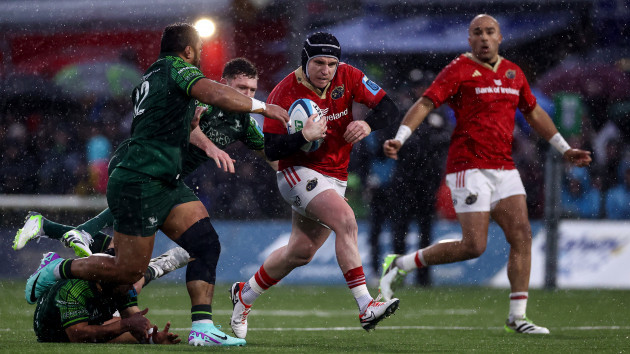A PUFF OF Rory Scannell’s cheeks tells its own story.
Last week, he clicked into an online squad-update link just to see in writing what Munster are dealing with on the injury front. It made for even more grim reading than Scannell had anticipated.
Earlier on the day of this interview, he learned that Jean Kleyn had been ruled out for the season.
Another good man gone. Another lock, too, adding to the long-term absentees alongside RG Snyman and Edwin Edogbo.
When it rains, it pours. And it has been bucketing down over Limerick of late.
“Whenever there’s a bit of an injury list, they tend to all be in the same position,” Scannell says. “Even chatting to my brother Niall, there, through the years, we’d have five senior hookers but at any one time there could be three of them injured.
“We’re lucky that a good few injured lads are back in training this week so the mood is still very positive, in the circumstances, ahead of Toulon.
“But to be fair, nah . . . I don’t think I’ve ever seen the injury list being quite that long.”
Scannell is working with a significant sample size: the youngest man ever to play 100 games for Munster turned 30 just before Christmas and is now just 12 appearances short of his double century. Scannell should reach that landmark at some point this year, which will mark his 10th involved with Munster’s senior team.
Hearing all of this out loud makes the former academy standout recoil in something approaching horror, mind.
“Jesus, it just doesn’t feel like it’s been that long at all,” Scannell says. “It’s actually getting scary because I’m one of the older members of the squad now, bar the four or five lads that are 34 or 35.
“I’d be chatting to my buddies from school and stuff and a lot of them are moving job every year or two, or going to Australia — or coming back, now!
“I can’t think of any of my buddies who have stayed in the same job since college. And when you think of it like that, it’s bizarre that I’m still here, doing the same thing.
“The time has absolutely flown by.”
He’s had fun, of course, across his 188 games. And whatever happens from here, Rory Scannell’s name will be accompanied by a URC title win on Wiki entries and rugby databases. That team accolade was a long time coming.
To some degree, Scannell and his on-field peer group had the misfortune of blossoming in a Munster ecosystem still well watered from the Heineken Cup successes of 2006 and 2008, as well as a Celtic League success the year before he joined the sub-academy in 2013.
A generation which spawned eventual provincial legends such as Peter O’Mahony, Conor Murray and Keith Earls was supposed to reach higher than even the giants on whose shoulders they stood. Axel Foley. Strings. ROG. Paulie.
Instead, during the 2010s, Scannell’s team — despite adding plenty of colour to Munster’s lore along the way — found themselves in danger of regressing from nearly men to never-gonna-be men. They became stuck in shadows cast by near neighbours and newly emerging French powers.
It was quite the cross to bear for players of Scannell’s vintage who were hand-chosen to emulate the demi-gods they cheered on throughout childhood. The longer they plugged away in the jersey, the more it became increasingly likely that they would never enjoy their Cardiff equivalent.
Cape Town last May went some way towards bridging the gap. And it offered closure to at least a portion of this Munster squad who have toiled through more inauspicious circumstances than their poor run of form in recent weeks.
“My first year with the senior team, we had a tough year,” says Scannell — and that’s putting it lightly.
His first season among the big boys — 2014/15 — involved not only a pool-stage European Cup exit but the accidental circulation among players of a document which detailed their perceived strengths and weaknesses on an excruciatingly personal level.
“But then when Rassie came in with Axel,” Scannell says, “we started playing in all these semi-finals, finals. We just weren’t getting over the line.
“And as one of the younger lads in the squad at that point, you’re obviously disappointed, but it’s, ‘Ah, there’ll be next year. There’ll be next year.’
“But time moves quickly and suddenly you find yourself chatting with Earlsy, who’s a close friend of mine, and he’s like, ‘Here, I haven’t won a trophy in 12 years.’
“For a long time, we were held to the same standard as the previous generation — and a lot of us grew up watching those lads. But think about it from Earlsy’s perspective: he played with them. He was part of that ’08 squad who won the Heineken Cup. He didn’t really feel like he was that involved in it so he wanted to be in a situation where he was actually playing in a final and winning it.
“So, last year was a weight lifted for a lot of us older lads.
“The younger lads probably now expect that for the rest of their careers. But it can be a lot harder than you’d think.”
Some of those up-and-comers have followed a similar pathway into Graham Rowntree’s senior team to the trail blazed by Scannell nearly a decade earlier.
It was the aforementioned ‘Axel’ who fast-tracked Scannell into his first-team plans back in November 2014, just over a year after Munster promoted the Presentation Brothers College graduate from sub-academy to full-time academy.
Scannell remembers vividly the fortnight during which Anthony Foley lit the match which sparked his professional career.
“At the time, I’d have been delighted even when I’d get a text to go up to senior training,” says Scannell.
“We were playing Sale in the European Cup and I was running at 10 on the other side in training. Axel said, ‘Look, we want you to prepare us for this week. We want you to play as much as you can like Danny Cipriani’ — he was Sale’s 10 at the time.
“. . . And I trained quite well!” Scannell says. “The lads probably weren’t too happy. The team running against them . . . Well, I’d say we prepared them well for the game but they probably weren’t too happy going home from training.
“The following week, we were playing Cardiff away in the league and Axel just pulled me aside ahead of a meeting and goes, ‘Listen, we’re very happy with how you trained last week so you’re going to be starting this week.’ I was in shock. I didn’t think I was in any way close to the team.
It was nearly a bit surreal. You spend your life watching guys like Axel when you’re growing up and all of a sudden he’s your head coach, telling you you’re starting a game for Munster.
“He put a lot of faith in me and I’m forever grateful for that, really.”
Scannell never looked back. In April 2016, after his second season with the seniors, the Douglas man almost did a clean sweep of Munster’s end-of-season awards. He was voted the province’s Young Player of the Year and separately took home the John McCarthy Award for best academy player. He was also shortlisted for the senior Player of the Year award, losing out to back-to-back winner CJ Stander.
Pres, Dolphin, and Munster had sculpted one hell of a young talent.
Tragedy, though, dictated that Anthony Foley caught only a brief glimpse of the player he had moulded into a fully fledged pro.
The first thing Scannell remembers about Sunday, 16 October 2016, is leaving Munster’s hotel in the Parisian suburb of Suresnes to do a final walk-through ahead of their Champions Cup meeting with Racing.
As was typical, the players split into backs and forwards. Scannell, gathered with the backs, glanced over at Munster’s frontmen and noticed that they were accompanied only by scrum coach Jerry Flannery, and not by head coach Foley as would be custom. It was highly unusual that Axel was late.
Both backs and pack cracked on with their respective rehearsals. In the meantime, performance analyst George Murray went back up to the hotel to knock on Foley’s door.
The next time Scannell saw Murray, the players were tucking into their pre-match meal. Whatever information Murray was able to provide upon his return, it sparked consternation among his fellow coaches. Scannell and his teammates didn’t think much of it. They’d be kicking off in a few hours’ time and if you were concentrating on anything else by this stage of the afternoon, you’d probably get blown out of it at La Défense Arena.
Only when the squad were greeted in the team room by a tearful Rassie Erasmus shortly afterwards did Scannell first think to himself, “‘Oh, this isn’t good.’”
It was Erasmus who broke the news to the assembled Munster players that Anthony Foley had passed away.
Then, white noise.
Scannell just remembers hanging around in the hotel lobby, not knowing what the hell to do.
At some stage along the line, Ronan O’Gara, who was assistant coach to opponents Racing at the time, arrived at Munster’s hotel to bear some of the weight.
Our tribute to Anthony Foley. pic.twitter.com/Y7TvNnOeFk
— Sky Sports Rugby Union (@SkySportsRugby) October 20, 2016
The speed with which Racing acted in postponing the fixture and offering all possible assistance to Munster on the day will mean that the Top 14 club will always sit in the southern province’s good books.
Seven years on, it strikes as even more unbelievable that Munster played Glasgow Warriors just six days after flying back from Paris — and just a single day after they laid their coach to rest in Kilmihil, Co Clare.
To Glasgow’s credit, they were equally open to a postponement. Given their working knowledge of Munster Rugby, it must have been to their horror that they saw such an offer politely declined.
Scannell can’t remember much from the Glasgow game-week, which is what shock does to you.
“I honestly don’t know if we even trained,” he says. History suggests Munster threw together two rudimentary sessions midweek which, in normal circumstances, would leave a professional sports team wildly short of the requisite preparation for a top-level meeting.
But this was to be a day on which Scannell’s generation joined their forebears in producing something totally abnormal.
“I just remember we got together before the game and we were saying, ‘Axel deserves something special from us today,’” says the centre.
“I haven’t experienced anything like that day, before or since, even at Thomond Park. The buzz of wanting to do it for Axel. It’s rare that you get 23 lads all at the very top of their game, and to click like that with very little preparation against a team full of Scottish internationals . . . It was just a great tribute to a great man, really.”
Scannell himself will be forever woven into the tapestry of that famous day for his province. The young midfielder was sensational as Munster — reduced to 14 men after Keith Earls’ early red card — somehow willed into existence a 38-17 victory.
Scannell teed up midfield partner Jaco Taute and fullback Simon Zebo for Munster’s second and third tries before diving over himself in the left-hand corner for the bonus-point score.
Munster’s customary, post-match rendition of ‘Stand Up and Fight’ took place at midfield in Thomond Park. It was Scannell who took Anthony Foley’s eldest son, Tony, under his wing for the sing-along. CJ Stander linked arms with Foley’s youngest son, Dan, to the other side of them.
After some encouragement from Stander, the Foley boys kicked things off.
New traditions were born that day, too.
“Ah, like, when we finish up in training or at the end of a game, we’ll still have, ’1-2-3, AXEL!’ Just little reminders like that,” Scannell says.
“Probably in the last three or four years there have been fewer of us who actually played under him, but then you have the likes of Denis Leamy and Mike Prendergast joining the coaching staff — and they both played with him. George Murray played with him, too, and worked with him. And there is still a lot of the squad whose careers Axel would have influenced.
“We don’t forget him, that’s for sure.”
It’s a point of pride for Scannell that he was named in the Pro 12 Dream Team at the end of a campaign in which he lost the coach who first trusted him enough to throw him into the senior ranks a season prior.
There were better times again a year later when his provincial form was rewarded with an Ireland test debut against the USA in New Jersey.
With hooker Niall already on the field at the Red Bull Arena, Rory came off the bench to make the Scannells the first brothers from Munster to represent Ireland in the professional era.
These days, the brothers try not to chat too much about work but that has become increasingly difficult of late: 20-cap international Niall, who lives in Cork with his wife Maeve and their new baby Charlie, stays two nights a week in Limerick with Rory and fiancée Aisling.
Things have moved quickly since that summer in America six and a half years ago.
It was around that time when Rory’s role as an inside centre at Munster began to change, too. Less rugby-football, more contact.
It has become almost a trope that Scannell has a bit of out-half in him: he entered Munster’s sub-academy as a 10, albeit he featured right across the backline for Ireland U20s in the 2013 Six Nations. But even as a career centre in the senior ranks, there is a distinction between how he likes to play the game and how he was deployed by his two previous Munster bosses.
Scannell has put the head down — often literally — for the guts of seven years. Only recently has he regained full licence to play ball the way he used to when he first picked one up as a kid.
“Obviously, playing 10 coming out of school and at U20 level, that kind of footballing role came a bit more naturally to me,” he says. “But when you change coaches and you have different gameplans, you nearly have to fit in a bit.
“Under Rassie and Johann, we played a very direct game which . . . I suppose, for me, it was frustrating because I just wasn’t able to show all my ability, really.
“Whatever about those frustrations, though, you have to adapt to the way your coaches want to play. You’re doing that for the team — and I’d always do that for the team, no questions asked.
But since Mike Prendergast has come in, it’s allowed me to be more natural in that midfield; to be more of a distributor as opposed to just one-out carrying. The last 18 months have been a breath of fresh air for me.
This reinvigoration was exemplified during Munster’s URC semi-final victory over Leinster last season.
Scannell, whose minutes in recent seasons had been limited by a string of international-level midfield recruitments — beginning with the “world-class” Damian de Allende — rolled back the years at the Aviva Stadium.
While the inception of Jack Crowley’s winning drop-goal at the Aviva was undoubtedly Gavin Coombes’ famous poach from a Leinster ruck, Scannell’s influence thereafter was of almost equal importance. He collected an offload from John Hodnett on his own try-line and stepped inside three Leinster defenders before teeing Hodnett back up for a burst towards the 22′, which led to Craig Casey’s booming clearing kick, which led to everything else.
Indeed, from his introduction for Ben Healy just after the half-hour mark, Scannell produced against Leinster what felt like one of the most complete displays of his Munster career.
And in retrospect, that reality makes perfect sense to the Cork man.
“I didn’t play for the four or five weeks prior”, Scannell says, “and at that stage of the season, I probably wasn’t expecting there to be many changes going into the semi-final. But we’d a couple of injuries over in Glasgow and then Ben got a bang early in the game.
“I didn’t really . . . Not that I didn’t prepare, but I wasn’t in the same mindset of putting myself under pressure going into that week because I didn’t think I’d be playing. I didn’t have a weight on my shoulders.
“I was probably able to express myself a bit more and it felt really good afterwards — the win, obviously, but also being able to play a bit more naturally, the way I would have when I was growing up.
“I think when I was in and around the Ireland squad at an earlier stage of my career, I was worried a bit more about each performance: ‘What will so-and-so think of this?’ Whereas now, I find I play my best rugby when I’m a bit more relaxed.
I see some of the younger lads coming in now and they’re all go, real serious and intense. I’ve just learned that that’s not really attainable for everyone — at least not for your whole career. There might be only one or two guys in a squad who can do it like that for 10 or 12 years. But there’s a chance that you’ll burn yourself out mentally — and actually physically as well.
Scannell stresses that it has taken him years to earn such a perspective. Even then, it’s not universal.
But at 30, he finds himself in a frame of mind in which he can embrace the fact that he’s living his childhood dream; he’s able to soak in the parts of being a Munster player that might once have seemed inconsequential.
“A lot of lads don’t have this long a career at this club. A few of the homegrown lads playing with Ireland obviously spend their whole careers here but I’ve plenty of friends that I came through with and depending on timing or injuries or whatever it is, it can be over in the blink of an eye as well.
In the last few years, seeing close friends of mine moving on . . . I just don’t take this for granted to the same extent as I did when I was young.
“Everyone thinks when they’re coming through, ‘Oh, this’ll be great, I’ll spend 15 years here.’ But when you see your friends not getting re-contracted or having to retire through injury, you realise how lucky you are. “So, I’ve been trying to enjoy it week by week for the last two or three seasons. And at the moment, I’m enjoying it a lot more than I had been for a good period of my career.”
The next personal milestone will be to join Axel Foley in Munster’s 200 Club.
Foley, who represented his province on 201 occasions, is one of only 11 players to have reached the double century for the southern province. Scannell is currently 12 appearances short, but he’s contracted until the end of next season. All going well and the 30-year-old will soon belong to the same pantheon as many of his heroes.
And a man who has experienced every extreme at the southern province since 2014 knows better than to look too far beyond that point for the moment.
“If I had to retire now, I’d be able to look back on some unbelievably fond memories,” Scannell says. “But I’ve been fortunate with injuries and I’d like to play on for a couple more years, anyway.
“I’d like to stay at Munster for my career if it’s possible but I’ve just seen in the last few years — again, with friends — that it might not happen.
“I think this team could go on to do something special. Our depth — well, obviously not right now with the injuries”, the centre laughs, “but it’s the strongest we’ve had since I’ve been at the club, anyway. We’re three or four lads deep in each position, whereas when I was coming through, there were a few positions where you could only chuck one or two lads into a first-tier game — like an interpro or European game.
“Winning a trophy last year, and having so many different players playing during that run of six or seven away games at the end of the season, gives us great confidence as a squad. And I know the last few weeks have obviously been frustrating but I think we know what we’re capable of.
“So, if I can continue playing for another few years, I’d love for it to be here.”


